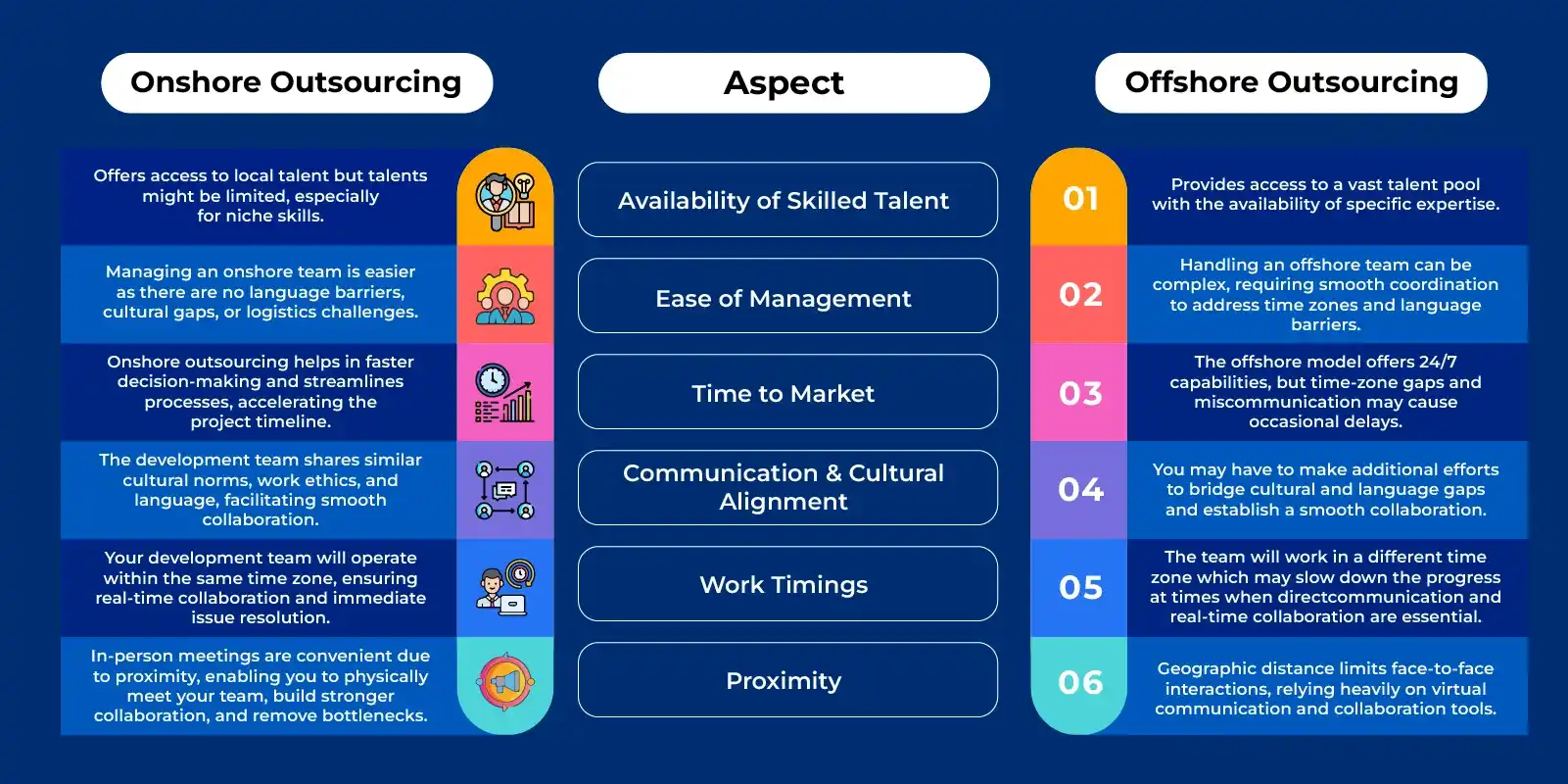Onshore vs. offshore outsourcing — Which is the best for your software development project? Is proximity worth the premium or does tapping into a global talent pool outweigh the risks of cultural and time zone differences? Choosing between onshore and offshore outsourcing impacts your project's outcomes.
Both offshore and onshore outsourcing have their benefits and drawbacks; understanding them helps you make an informed decision. Join us as we explore what is the difference between onshore and offshore outsourcing.
This Article Contains:
What is Onshore Outsourcing?
Onshore outsourcing is partnering with a software development company within your country or region. This outsourcing model ensures better communication and streamlined project management. A US-based company partnering with a software development company within the country is onshore outsourcing.
What is Offshore Outsourcing?
Offshore outsourcing involves hiring a software development company in a different country, typically from a low-cost region to reduce cost and access a wider talent pool or niche experts. For example, a US-based firm partnering with a dedicated software development team in countries like India, the Philippines, or Ukraine.
What is the Difference Between Onshore and Offshore Outsourcing - A Detailed Comparison
According to a Straits Research report, the global IT outsourcing market was around USD 342.6 billion in 2023 and is projected to grow at a CAGR of 9.3% between 2024 and 2032 to reach USD 770.98 billion by 2032.
This shows businesses are increasingly outsourcing their software projects. But should you choose an onshore or offshore model? Let's understand the difference between offshore and onshore outsourcing on key criteria.

| Aspect | Onshore Outsourcing | Offshore Outsourcing |
|---|---|---|
| Availability of Skilled Talent | Offers access to local talent, but competencies might be limited, especially for niche skills. | Provides access to a vast talent pool with the availability of specific expertise. |
| Ease of Management | Managing an onshore team is easier as there are no language barriers, cultural gaps, or logistics challenges. | Handling an offshore team can be complex, requiring smooth coordination to address time zones and language barriers. |
| Time to Market | Onshore outsourcing helps in faster decision-making and streamlines processes, accelerating the project timeline. | The offshore model offers 24/7 capabilities, but time-zone gaps and miscommunication may cause occasional delays. |
| Communication & Cultural Alignment | The development team shares similar cultural norms, work ethics, and language, facilitating smooth collaboration. | You may have to make additional efforts to bridge cultural and language gaps and establish a smooth collaboration. |
| Work Timings | Your development team will operate within the same time zone, ensuring real-time collaboration and immediate issue resolution. | The team will work in a different time zone which may slow down the progress at times when direct communication and real-time collaboration are essential. |
| Proximity | In-person meetings are convenient due to proximity, enabling you to physically meet your team, build stronger collaboration, and remove bottlenecks. | Geographic distance limits face-to-face interactions, relying heavily on virtual communication and collaboration tools. |
Advantages and Disadvantages of Onshore and Offshore Outsourcing
Are you aware that companies can save up to 50% of labor costs by outsourcing software development projects? But should you use offshore or onshore outsourcing?
Both outsourcing approaches have their pros and cons. Understanding these advantages and disadvantages will help you choose an outsourcing model that aligns with your business goals.
Advantages of Onshore Outsourcing

Seamless Communication
Isn't effective communication critical for a successful outsourcing partnership? With onshore outsourcing, you can enjoy seamless collaboration with your software development partner, which will positively impact project timelines. You can easily communicate during your working hours, and receive timely updates, ensuring high-quality results within the deadline.
Easier Legal and Regulatory Compliance
Managing the complexities of international laws and regulations is time-consuming and involves a lot of hassles. This can be daunting, especially if you haven't used offshore outsourcing earlier. With onshore outsourcing, you can reduce these risks and adhere to industry standards.
Better Quality Control
Quality control is crucial to build high-quality software. When you collaborate with an onshore outsourcing partner, you can enjoy better quality control and monitoring as the team follows similar work ethics, and business practices and understands language nuances, which ensures the highest quality standard.
Faster Issue Resolution
Software development is a complex process, and many issues arise during development. Resolving these issues quickly is critical for timely completion. Onshore outsourcing enables faster issue resolution because of proximity and real-time communication.
Disadvantages of Onshore Outsourcing

Limited Talent Pool
Do you need specialized skills or expertise for your software development project? If so, onshore outsourcing may not be a great choice as it limits your access to a larger talent pool. You may find it challenging to hire the right talents with the required skills and experience.
Higher Costs
While onshore outsourcing offers numerous benefits, it comes with a higher price tag! The labor costs can be significantly higher when you work with a domestic software development partner, which may impact your project's budget and ROI.
Scalability Challenges
Can you expand your team quickly in onshore outsourcing?
Hiring additional members quickly during peak demands can be difficult with onshore outsourcing due to limited local resources. This can affect your company's ability to respond to changing market conditions or customer demands.
Advantages of Offshore Outsourcing
Lower Costs
One of the differences between onshore and offshore outsourcing is the significant cost savings. By partnering with a reputable offshore software development company, you can save on labor costs while ensuring high-quality standards.
Global Talent Pool
With offshore outsourcing, you can access a global talent pool with specialized skills and expertise that may not be available in your location. Whether you want to hire a technology partner for digital transformation or build custom software, you can easily find talented resources.
Seamless Scalability
Offshore outsourcing offers unmatched flexibility to scale your development team. You can quickly ramp up or down your team based on project requirements, without the overhead of hiring and training new employees. This makes IT staff augmentation much easier when working with a global partner.
Faster Time to Market
Offshore outsourcing allows you to hire a software development team within a few days as you have multiple options. This helps you accelerate the development process and significantly reduces the time to market.
Disadvantages of Offshore Outsourcing
Communication Barriers
While partnering with an offshore software development company offers many benefits, communication can be a major challenge. Time zone gaps, language barriers, and cultural differences can lead to misunderstandings and delays.
Security and Intellectual Property Risks
How secure is your sensitive business data when working with an offshore company? This is one of the critical questions you might have when outsourcing software development to a remote country. Offshore outsourcing can increase security and intellectual property risks as unauthorized people may access the data. However, choosing a reliable partner can reduce these risks.
Quality Control
Maintaining top-class quality can be challenging when working with an offshore partner as they might have different development methodologies, work cultures, and ethics. This can impact the quality of deliverables. To ensure high-quality results, you should set clear expectations, define quality standards, and implement regular review mechanisms.
Final Take: Which is the Right Outsourcing Model for Your Project?
As you analyze the difference between onshore and offshore outsourcing, remember that the ultimate goal is to find a software development partner that meets your business objectives, budget, and timeline. While both outsourcing approaches offer unique advantages, offshore outsourcing offers a better option in terms of cost savings, ROI, and access to specialized global talent.
At Mayura Consultancy Services (MCS), we specialize in offshore software development with a special focus on seamless collaboration. We develop tailored solutions aligned with your needs and ensure timely project completion. Contact us to know more.
Frequently Asked Questions
Outsourcing software development offers many benefits, such as cost savings, access to specialized skills, increased efficiency, and faster time-to-market, enabling businesses to generate better ROI and stay ahead of their competitors.
Yes, the offshore outsourcing model can deliver the same quality as onshore outsourcing when you collaborate with a reputable company like MCS. We have a proven track record of delivering 300+ projects across 25 countries. Our team follows rigorous quality control measures to ensure the project meets your requirements.
To ensure smooth communication, you should establish a communication channel and leverage collaboration tools like Slack, Trello, or Asana. Besides that, you can use regular video conferencing and specify a designated point of contact to address bottlenecks.
Here are the steps to ensure compliance with data security regulations.
-
Choose a company that follows top software testing trends and robust data security policies
-
Implement a data privacy agreement
-
Train your offshore teams on privacy standards
-
Use technology to monitor how they handle data
-
Sign a non-disclosure agreement (NDA)







Comments
Share Your Feedback
Your email address will not be published. Required fields are marked *